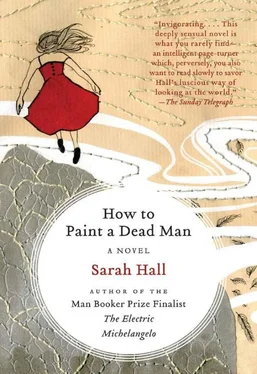Sarah Hall - How to Paint a Dead Man
Здесь есть возможность читать онлайн «Sarah Hall - How to Paint a Dead Man» весь текст электронной книги совершенно бесплатно (целиком полную версию без сокращений). В некоторых случаях можно слушать аудио, скачать через торрент в формате fb2 и присутствует краткое содержание. Год выпуска: 2009, Издательство: Harper Perennial, Жанр: Современная проза, на английском языке. Описание произведения, (предисловие) а так же отзывы посетителей доступны на портале библиотеки ЛибКат.
- Название:How to Paint a Dead Man
- Автор:
- Издательство:Harper Perennial
- Жанр:
- Год:2009
- ISBN:нет данных
- Рейтинг книги:4 / 5. Голосов: 1
-
Избранное:Добавить в избранное
- Отзывы:
-
Ваша оценка:
- 80
- 1
- 2
- 3
- 4
- 5
How to Paint a Dead Man: краткое содержание, описание и аннотация
Предлагаем к чтению аннотацию, описание, краткое содержание или предисловие (зависит от того, что написал сам автор книги «How to Paint a Dead Man»). Если вы не нашли необходимую информацию о книге — напишите в комментариях, мы постараемся отыскать её.
, Sarah Hall, "one of the most significant and exciting of Britain's young novelists" (
), delivers "a maddeningly enticing read... an amazing feat of literary engineering" (
).
How to Paint a Dead Man — читать онлайн бесплатно полную книгу (весь текст) целиком
Ниже представлен текст книги, разбитый по страницам. Система сохранения места последней прочитанной страницы, позволяет с удобством читать онлайн бесплатно книгу «How to Paint a Dead Man», без необходимости каждый раз заново искать на чём Вы остановились. Поставьте закладку, и сможете в любой момент перейти на страницу, на которой закончили чтение.
Интервал:
Закладка:
We spent an hour in the glass dome of birds, admiring their rich plumage. We strolled the conservatories and felt a welcome lightness of spirit. We gave new names to our favourite characters, as if we were cataloguing specimens in an uncharted land. We discerned the bolder personalities from those too shy to linger at the rails. Children tried to capture feathers from the green tails of the peacocks.
I mentioned to Theresa that I thought she was in fact a very good colourist and that I always notice the areas of the house where her arrangements are complementary and I thanked her for her years of good service. She shed her tears again and would not be consoled, and once again she sounded like a distressed bird, and I hoped that the exotic parrots might fly down and comfort her. We visited the church and she lit a candle-there were queues along the staircases so we did not go down to see the frescoes and the sacred robe. We bought pencils embossed with gold letters for her nieces and nephews, of which there appear to be several hundred now.
When we returned to Serra Partucci it was evening and she prepared salted vegetables, which we ate together at the table as if at a restaurant. I was of half a mind to read Ugo Foscolo to her but I thought perhaps it was too much and that she would once again break down. We sat companionably until the dusk arrived. Then, instead of walking her bicycle down the hill, which is her custom, she mounted it and I heard its wheels un-stiffening as she rode.
I had not truly realised her attachment to her position here, nor her affection for the stubborn old man for whom she caters every day.
Today she is her usual self again-that is to say, she has been banging in the kitchen and terrorising the house. We had a minor quarrel when she attempted to make me eat breakfast. I have no appetite, and the excursion yesterday had tired me. I wish to begin painting, but I have been too distracted. All I want to do is look out of the window at the view I love so much. A kestrel has been hovering in the air above the slopes, intimidating the mice and the larks. The ravens mock it, tumbling from the sky as if to strike a target. They fall suddenly, as if shot with a pistol, and then they recover. They are birds of the circus, trained for swinging on trapezes, and cannot balance on the tightrope of the hunt.
I read in the newspaper that on the greatest mountain in Africa the skeleton of an elephant has been discovered. It lies at an impossible altitude, as if the creature were seeking a path to the glaciers at the summit. Only God might know the reason for its journey. How slowly it must have moved, and in incomparable privacy, perhaps anticipating its fate. That animals choose their resting place speaks of a curious foreknowledge. In the East, they believe the soul travels at the speed of a camel. Perhaps migration and meditation are close to the same thing. But stillness might also offer enlightenment. Outside, the kestrel perches in silhouette on the scorched branch of an olive tree, unmoving. It recognises the glimmer of coprolites in the rock and the wet-brown eyes of the voles. The contours of its head and wings are like those of the milliner’s mannequin, borrowed by De Chirico to discuss the metaphysical. The kestrel achieves perfection in stillness.
I do not like to see omens in small occurrences, but a plague of dead flies has visited this room. In every corner there are upturned black bodies, balanced on dry wings, so it seems each ascends from the ground by a fraction, keeping in the death-pose a portion of that skill which they possessed during life. I prefer the shutters to be left open, even when it is chilly, so the house invites all kinds of little visitors. There are often scorpions on the steps. Strangely, these provide less consternation to Theresa than the lizards. The locusts have hatched from their tunnels now and have gone. The soft little phosphorous ones no longer illuminate the garden at night. Only the moths remain, drumming against the lamps. From inside the glass shades there is whispering. The moths are speaking of our prehistory, discussing the world before fire perhaps.
As a boy I kept a jar of dirt in which the traffic moved casually between the layers. Grubs and beetles got along together very well. I liked to watch the rows of ants scaling the sides. In this small condominium there would be the neighbourly investigation of items dropped inside — a Roman coin, sulphur, dough. Each fellow within the jar would attend to the object at its own speed and then return to its interval of soil.
I look out at the mountains, so dear to me. Their place on the horizon is utmost. It would be difficult to take them down and alter the sky around them; it would seem like an unfinished composition. There is sadness at the thought of leaving them, even while I rejoice in their presence. How can I explain the longing in my breast for what is present before me? I surprise myself with this melancholy. I have told them not to operate.
Tomorrow, Antonio is arriving. No doubt he will fuss and try to organise, and he will want to see the painting, which is unfinished. I have asked him to bring the official documents necessary for the transfer of the estate. It is all quite complicated. There is talk of creating a museum and there have been several requests for donations, which I must consider. Florio is also coming with a breathing mask and a tank. It will be impossible to drive up the hill in an ambulance; I do not know how he is going to manage it. The house will inevitably be too crowded. They will all buzz about and squabble over my chair and get under Theresa’s feet, and everyone will need to be separated and calmed. Serra Partucci will no longer be a peaceful hermitage.
Often I tell visitors, who come and who sit uncomfortably in their city garments, to be heedless of the train timetables. I invite them to remain past the hour of their appointment, to take some wine and sit outside and relax. Take your hand from your wrist, I tell them, your blood pressure is not abnormal, you are not on the verge of disaster. Listen to this greater pulse, to the lowing of cattle and the beating of wings against the wind. The earth grunts as it dislodges and buds break open. Can you hear? The pulse will be there too in the place where you live, I say to them. Nowhere is exempt from the service of Nature. Perhaps the drains and cables between buildings are like stethoscopes, and you may hear the heartbeat of the city if you listen.
My visitors indulge me. They are charmed by my antiquity and my devotion to this place. Later they walk back to the station along the road, and perhaps halfway they kneel with an ear to the ground. And perhaps they hear their own blood, and then the traffic in the town, and then a deeper rhythm. They get up, and brush the dust from their knees, and they continue walking. If everything seems lost, I tell them, trust the heart.
The Fool on the Hill
When he gets home the house is quiet. No one is inside. He walks through the kitchen and the sitting room and goes out the back door. Lydia is in the garden retying beanstalks, with oversized canvas gloves on her hands. She seems engrossed in what she is doing, intent on the binding. The air is very still around him but her dress is rippling madly against her arms. Her straw hat keeps threatening to blow off and, under it, her hair is snaking about, tying itself in knots. It’s not the right time of year to be worrying about reinforcing the vegetables, but she has a sense for the turning of the weather and he can see that she herself is stormy, so perhaps it is all right. He waves to her. ‘Are we expecting a gale?’ She doesn’t look up. She flops a gloved hand towards her hat, too late, and it flies off her head and into the distance. There is a shaved patch on her crown. She tautens a length of string, as if about to garrotte the beans. She bends down among the frothy green runners and disappears.
Читать дальшеИнтервал:
Закладка:
Похожие книги на «How to Paint a Dead Man»
Представляем Вашему вниманию похожие книги на «How to Paint a Dead Man» списком для выбора. Мы отобрали схожую по названию и смыслу литературу в надежде предоставить читателям больше вариантов отыскать новые, интересные, ещё непрочитанные произведения.
Обсуждение, отзывы о книге «How to Paint a Dead Man» и просто собственные мнения читателей. Оставьте ваши комментарии, напишите, что Вы думаете о произведении, его смысле или главных героях. Укажите что конкретно понравилось, а что нет, и почему Вы так считаете.












